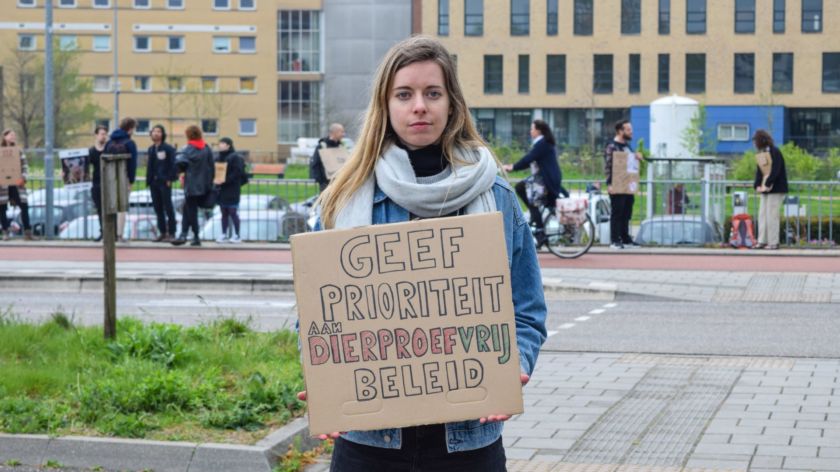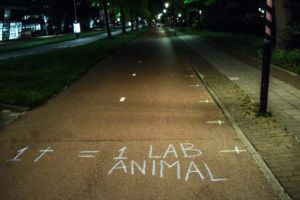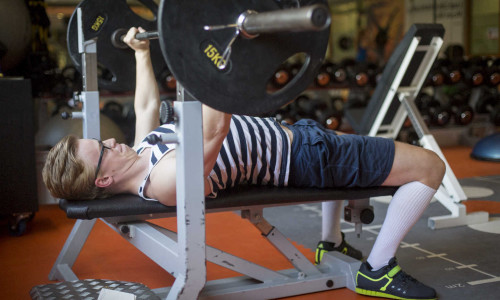On World Day for Laboratory Animals, Vegan Student Association argues for a zero-animal testing campus
-
 Foto: Paul van Gent
Foto: Paul van Gent
Students of the Vegan Student Association (VSA) called on the university today to stop using laboratory animals. Opposite the Huygens building, about twenty activists stood with signs to 'create awareness about animal testing'. Last Sunday, the association already organised a chalk action on the campus to draw attention to the subject.
At first glance they appear to be cheerful coloured tiles, but if you look closely nothing could be further from the truth. The more than 8000 chalk crosses on campus symbolise the number of animals used by Radboud University as laboratory animals by 2020.
The chalk action was organised yesterday, on World Day for Laboratory Animals, a day when people all over the world demonstrate against experimenting with animals. Today (Monday) twenty students protested opposite the Huygens building. They stood with their backs turned towards the Central Animal Laboratory.
Thousands of laboratory animals
With these actions VSA calls on Radboudumc and Radboud University to phase out animal testing. They feel that the two institutions do not take sufficient responsibility when it comes to the usefulness and necessity of animal testing. The student association cites the cancellation of SYRCLE as an argument, an initiative aimed at supporting reliable preliminary research in order to reduce unnecessary animal testing.
VSA member and co-organiser of the protest Rebecca van Eijden (26) says that with the chalk action and the protest she also wants to make students aware of the university’s animal testing policy. ‘Many students do not know that thousands of laboratory animals are still used on the campus,’ says the Environment & Society Studies student.
In 2020 – these are the most recent figures available – 8321 animals were used as laboratory animals on campus in Nijmegen. Van Eijden: ‘Radboud University is thus still actively contributing to maintaining the use of laboratory animals in science.’
Covid vaccine
This is because animal testing is still the standard, but according to Van Eijden that is not always necessary. ‘Especially because in many cases an animal is not a good representation of a human being. In the case of psychiatric disorders, for example, an animal-free alternative is more translatable to humans. Sometimes a reformulation of your research question can already lead to animal testing no longer being necessary.’
‘In many cases an animal is not a good representation of a human being
Not all research has a non-animal alternative. The covid vaccine, for example, could be developed so quickly partly thanks to the use of animal testing. However, Van Eijden sees this as a consequence of delaying the switch to animal-free research. ‘If they had used those methods earlier, the research on covid vaccines might have progressed much faster.’
Last year, the university organised an Honours Lab on the transition to non-animal medical research. Van Eijden: ‘I participated in that. It is a very good initiative, but now they have to follow it up and use the insights to initiate the transition on campus.’
RadboudUMC
RadboudUMC spokesperson Margie Alders says that their animal testing is in line with the three Rs: replacement, reduction and refinement. ‘Where it is not necessary, we do not use animals for research.’ They also work with alternative methods where possible. ‘But for some research the use of animal testing is even a legal requirement,’ says Alders.
The spokesperson says that SYRCLE has been disbanded because it has not been able to attract sufficient external funding on a permanent basis. ‘We acknowledge the important role that SYRCLE has played in the development of systematic reviews. Its vision and methodology are now embedded in our research and are widely applied.’




